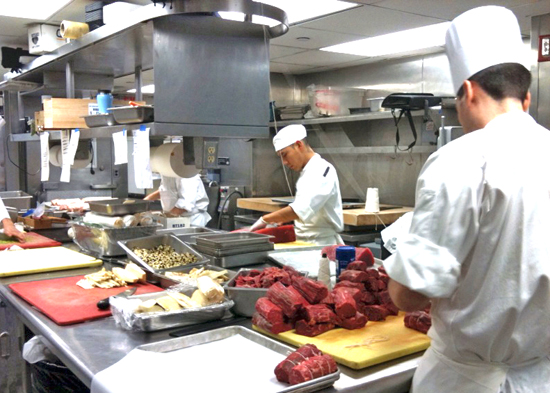ICE’s Culinary Management Instructors are seasoned industry professionals who are still active in the industry, working on their own projects while teaching classes at ICE. With such a wide range of experience between them, we decided to ask Julia Heyer and Vin McCann to take a closer look at the business of running a restaurant. Today, they discuss just how difficult it is to open a restaurant.

Julia Heyer: I am writing in the midst of a new restaurant opening in the heart of Hamburg, Germany. The concept offers quick, fresh salads, soups, house-made yogurts and fruit salads. The good news is that the lessons we teach at ICE have once more proven relevant and true.
The surrounding community has embraced the concept (which was two years in the planning) since the opening. We hired a positive front-of-house team, trained them well and gave them the tools to provide lovely service while cranking out fresh, beautiful salads in less than two minutes. The entire staff worked as smoothly as the purple curry dressing that is quickly turning into a top seller. Now, the back-of-the-house was a different story.
And here is the lesson: having a good palette and some theoretical skills is a start, but in this business you need more. If you want to run a kitchen, even a limited size one, you must have:
Competence: At the very least one must know the difference between internal temperatures for rare and medium roast beef. And one shouldn’t make that same mistake twice. Knife skills are also indispensable. My three-year-old nephew’s speed and accuracy should not be the performance standard
Planning & Organizational Skills: Yes, you need to plan your production! The term mise en place should not be a foreign language to you. What is purchased, produced and assembled, and when and in what quantity you do it should not be decided spur of the moment but ahead of time, taking into account your forecast, inventories, storage and team capacities. Planning ahead will prevent wasting time on calling your vegetable vendor three times in three hours, because you keep “forgetting” things. Efficiencies are not an accident. It’s something you strive for.
Interpersonal Skills & Problem-Solving: If you see something, say something. And ideally, something productive that provides an offer of solution too, instead of just complaining. As a rule, you can say anything to anyone but, ‘der Ton macht die Musik” — the tone makes the music. It is all about how you say it. Be professional and nice where you can.
Vin McCann: My, my, Julia, you sound a bit peevish. Kitchen let you down, did it? Let me guess, your consulting responsibility covered only the front of the house. Mercifully, your client wasn’t in the back. Where was the boss? All ships, and certainly those on the maiden voyage, must have a captain. There’s got to be someone who must be obeyed. As we both preach, openings are gargantuan struggles in an exercise in hoping for control when you actually have very little. Nothing can be assumed. What worked well in the previous shift will not automatically happen in the next. Someone must be chained to the helm issuing countless orders to correct the shortcomings. Without a leader a restaurant opening can turn into a trip down the rabbit hole. Welcome home, Alice.
Julia’s Response: Dear caterpillar, yes, I was a bit peeved, as I had been spoiled by competent, energetic, positive team players in the back-of-the-house for my last few openings. It had been a few years since having to work through an opening with someone who should be playing in the third regional division but is behaving like they’re bending it like Beckham in the Champions League. Ego is something one can work with, but only if it is backed up with competence and results. Without it, starting a restaurant required putting on my firefighting uniform, including a pair of bossy pants and a captain’s hat. It is not exactly cute. I shall model when back at the ICE…
Vinn’s Final Word: I can feel your pain, but regardless, I think the moral of the story is the boss bears the blame.



